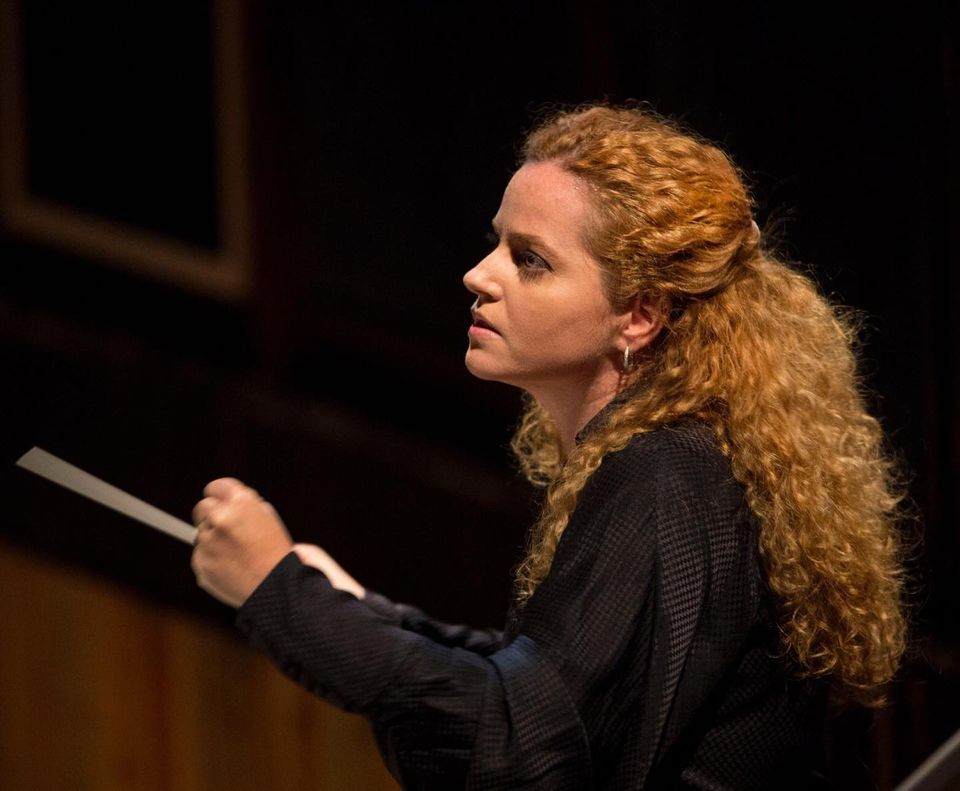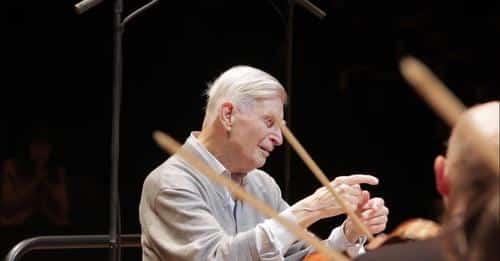Music is universal, nothing to do with gender
NewsThe Italian conductor Speranza Scappucci, after making her La Scala debut:
I am sure to be the first of many. I am aware of being a woman in a professions that has been the prerogative of men… but I belong to an historical period in which things have changed: we value people’s preparation and talent.
When I conduct I simply think that I am a musician who offers her preparation, her musical ideas, to other musicians.
More here.






She is entirely right. Musical ability has nothing to do with gender. She is also right that she is “a woman in a professions [sic] that has been the prerogative of men”…and that those who bemoan that there are too many women conductors, or that women now win too many auditions, contracts, agencies, etc. effectively seek to preserve conducting as a “prerogative of men”.
Hope you’re joking. She is saying like – wow incredible, first time in 1000 years woman is conducting an opera in music theatre.
C’mon! If you need a job in music – be a girl and go waving your hands in front of the orchestra
From the Italian interview:
Come ci si sente a essere la prima donna italiana a dirigere un’opera alla Scala?
Mi rende orgogliosa e felice: spero e sono sicuro di essere la prima di tante. Sono sociente di essere donna in un mestiere per tanti anni appannaggio di soli uomini, ma appartengo a un periodo storico in cui le cose sono cambiate: valorizziamo la preparazione e il talento delle persone e non concentriamoci piu solo sul genere.
So no, she is not saying anything like what you say she says!
correction – cosciente
Read the original Italian, not an incompetent Google translation, as you’ve simply got this and your translation of what she said all totally plain wrong!
Absolutely insulting! Maybe tell her, and any other woman conductor, to her face perhaps? Nah! You haven’t got the guts, only hiding on here.
She hasn’t tried or been invited by the male dominated Vienna Phil yet!
She has, actually: https://youtu.be/Jw_yvlLn21E
I don’t think people do bemoan that there are too many female conductors. What they are complaining about is quotas and diversity training – which has ZERO to do with either music or talent of any kind. Let the cards fall where they may; but we all should know fully well that equality of outcomes cannot afford the cards to fall in this way.
Of course it is. But our epoch could be defined as a radical attack on the very idea of universality, which has now been scattered into insular communities and allegiances seemingly incapable of communicating or looking beyond their private spheres. This in my opinion is indissociable from a radical, and rather immature, sense of individuality — closer to narcissism, really — in which the individual becomes completely separate from the community s/he unavoidably belongs to. Together with this mindset, comes the loss of reason, of a common world, as well as the rise of a culture of grievance and, paradoxically, the loss of real solidarity, as these separate identities become completely impervious to one another and are locked into their own thought paradigms. This phenomenon is also related to existences which are now becoming increasingly digital, as opposed to taking place in the real world, with all the many inconveniences this might entail. With the rise of the coming Metaverse, I shudder to think what kind of future communities will be able to be built, and what the place of art as well as that of critical thought might become in such a paradigm, when we are no longer truly reached or claimed by the real.
Excellent post.
Entirely, and tragically, agreed.
But since every reaction produces counterreactions, it is possible that groups who resist this tendency, will grow.
“The Culture of Narcissism: American Life in an Age of Diminishing Expectations”, Christopher Lasch, 1979.
More wordy than Goethe, and far less poetic.
Yes, these things are irritating – I am also often profoundly irritated about the apple who refuses to be a banana or the other way around.
How does it feel to be the first Italian woman to conduct an opera at La Scala?
“It makes me proud and happy: I hope and I am sure to be the first of many. I am aware of being a woman in a profession that has been the prerogative of men only for many years, but I belong to a historical period in which things have changed: we value people’s preparation and talent and let’s not focus only on gender anymore. When I conduct I simply think that I am a musician who offers her sensibility, her preparation, her musical ideas to other musicians. Music, after all, is a universal language.”
Is there a female sensitivity in making music?
“I do not believe. There is the sensibility of the musician, regardless of the genre. We artists have our own sensitivity that we transform into music and necessarily pass on to singers and other musicians.”
A dutiful question: do you want to be called director or director?
“Since the term director exists in the Italian vocabulary, as well as in German and French, we decline to the feminine. We don’t even have to invent the word. And if someone calls me a teacher or, as often happens abroad, a teacher, it’s the same for me. It makes you smile and I don’t mind. Maestro is now an almost neutral word, which defines the role. I am convinced that one day, over time, even the master word will become commonplace. On the other hand, the language changes with society.”
Music is NOT universal.
Proof:
You could stick Syrians and Filipinos in suits and hand them violins and have them play Monteverdi, but who would want that? It would be a disgusting act of ignorance of who someone is (their identity); and have them make a mockery of some else’s identity (in this case Monteverdi).
So no. Music is NOT universal.
Unless you subscribe to goody-goody-two-shoes-idiocy and hysterically scream that everyone is the same, that everyone is replaceable.
Translated: ‘So, Syrians and Pinoy should NOT be allowed to play Western classical music because it conflicts with their identity. Thinking of all those Chinese, Koreans, Japanese, South-Americans, New York inhabitants, Irishmen and – women, Finns, etc. who have the impertinence to play music which does not belong to their identity, there’s a lot of musical promiscuity going-on today. There even seem to be Germans playing Italian music, and French people playing German music, as if there never have been wars of 1870, 1914 and 1938. The winner of the Chopin competition is, grave offence! a Canadian Chinese – how wild can you get it? Music should stick to its cultural and ethnic roots of purity and not be polluted by foreigners. And China is a scandal on a planetary scale: a country filled to the brim with foreigners (Chinese all of them!) playing Beethoven on western-style pianos!’
Filipinos have had a symphony orchestra, playing classical music, since 1973. Would your prefer that they close it down, on the grounds that it is antithetical to their “identity”?
What a stupid and sick comment. Stupid because anyone from anywhere in the world can play western classical music if they want to and are given the chance to train and have the necessary talent; sick because it confines identity narrowly to race and nationality, and everybody knows where that kind of thinking leads.
What a ridiculous argument . . . I mean, really? . . . someone has to explain to you that she’s talking about people who are skilled and trained in the SAME music. In other words, to use your type of analogy, would a Monteverdi work conducted by a German be obvious and apparent? How about conducted by a woman in a blindfold test – could you really tell? And if a string player from the Philippines were fully trained on their instrument, could you really stop and say, “a-ha! I hear a Filipino somewhere in the string section!”.
Steve Jobs was Syrian. What are you saying?
A bit hypocritical of her to imply she got the job solely on merit. The pendulum has swung in a different direction, that’s all, but it isn’t the direction of pure meritocracy. Perhaps it will be so some day, though I doubt it; appreciation of talent in the field of performing arts has always been, and will always be, subjective. And when the pool of excellent candidates is larger than the jobs pool, some other, extraneous criteria will be applied, and outcomes will be unequal. I bet male conductors of the past also thought they got their jobs solely on merit. Winners prefer to believe that the world is just.
“ Esiste una sensibilità femminile nel fare musica?
Non credo. Esiste la sensibilità del musicista, a prescindere dal genere. Noi artisti abbiamo una nostra sensibilità che trasformiamo in musica e necessariamente trasmettiamo ai cantanti e agli altri musicisti.”
True — there is a musical sensibility not a feminine one. After all, could you tell just by listening if the conductor is male or female?
But such nonsense is repeated as if it were fact.
(Nonsense is often claimed as fact of course … one thinks of politics).
Well, try to say the same words when you are not having a career. Speranza, we needs more help from the people like you for the people who have no “Speranza”.
Well, may I also suggest to a well-fed person: enjoy your food and please don’t say there is no starvation in the world.
“…but I belong to an historical period in which things have changed: we value people’s preparation and talent.”
Sorry, no. We value mindless social ‘correctness’ that is slowly and surely damaging the entire classical scene.
I don’t understand why that music should be more important than people! It’s not about the music, as I see it, but about justice being done! I would think it’s much more important if such pieces, which are boring anyway, are played by us and not by all those pretentious fogeys waving their hair while we simply have much more of it! It’s all about symbol & correcting ages of injustice. I rest my place.
Sally